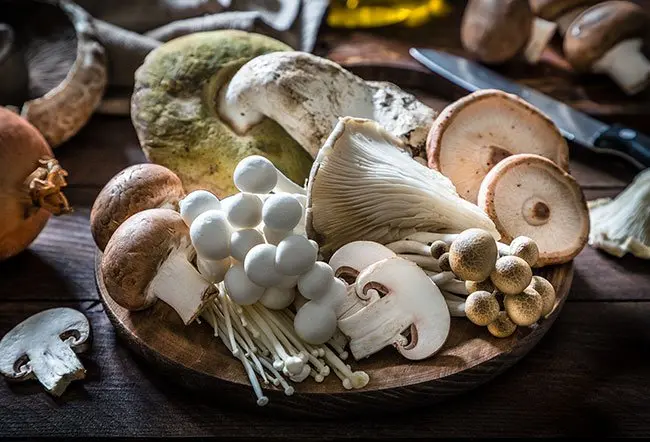Medicinal mushroom types

Часто считается овощем, Грибы не являются ни растениями, ни животными. Они принадлежат к уникальному царству грибов. Unlike plants that make their food using sunlight and animals that eat their food, fungi have a unique way of obtaining nutrition. They have certain thread-like structures called mycelia (singular mycelium) that grow into or around the food source and release digestive enzymes to break down food externally that is then absorbed by mycelia. Mushrooms are fruiting bodies of the mycelium.
Being addressed with terms such as “the elixir of life” and “foods for the Gods,” mushrooms are truly packed with several health-boosting nutrients. They are the richest natural source of vitamin D for vegetarians. They are low in calories and have virtually no cholesterol or fat. They are rich in protein, fiber, vitamins (such as riboflavin [vitamin B2], Ниацин, folate and traces of vitamins B1, B12, C, D and E), potassium, phosphorus and selenium. The protein content of mushrooms is higher than that of most vegetables. Not just in quantity, proteins in mushrooms are also rich in quality because they provide most of the essential amino acids required in the diet. Mushrooms are full of antioxidants including phenolic compounds that protect you from allergies, heart disease, infections, inflammatory diseases, high blood pressure and cancer. Because mushrooms are rich in fiber and low in calories, they are great for weight management.
Mushrooms are being marketed as supplements or medicinal mushrooms with claims that they can promote brain and heart health and prevent cancer. There are, однако, insufficient clinical trials to support these claims. Although good for health, you must not replace mushrooms with prescribed medicines. Some of the mushrooms considered best for human health include
- Chaga mushroom (scientific name: Inonotus obliquus): It is also called “the king of medicinal mushrooms.” It is not a true mushroom but a mass of mycelia (called sclerotium). This mushroom is rich in various antioxidants. It boosts immunity, brain health and liver health and may thus increase life span.
- Lion’s mane mushroom (scientific name: Hericium erinaceus): It is also called “the mushroom for the mind” because of its role in promoting brain health and nerve function. It contains important compounds such as beta-glucans known for their tumor-protecting, immune-boosting and brain-protective properties. It may play a role in protecting against diseases such as Parkinson’s and Alzheimer’s.
- Reishi mushroom (scientific name: Ganoderma lucidum): It is also called “the mushroom for immortality.” It boosts immunity, promotes restful sleep, fights fatigue and reduces stress.
- Turkey tail mushroom (scientific name: Trametes versicolor и Coriolus versicolor): It is also called “the mushroom of several colors.” It is one of the most popular medicinal mushrooms. It boosts immunity and is said to fight cancer cells. It also promotes gut health.
- Shiitake mushroom (scientific name: Lentinula edodes): It is also called “the fragrant mushroom.” It is known for its delicious flavor. It reduces inflammation in the body and boosts liver function, heart health and immunity.
- Cordyceps mushroom (scientific name: Cordyceps sinensis): It is also called “the caterpillar mushroom.” It is known for its role in increasing energy production inside the cells. It may protect from allergies and boost lung health.
- Maitake mushroom (scientific name: Grifola frondose): It is also called “the dancing mushroom.” It is famous for boosting immunity, regulating blood sugar and cholesterol levels, regulating blood pressure and aiding weight loss.
 ЧЖАНЧЖОУ ЦЗЯВЭЙ ФУДС КО., ЛТД.
ЧЖАНЧЖОУ ЦЗЯВЭЙ ФУДС КО., ЛТД.
